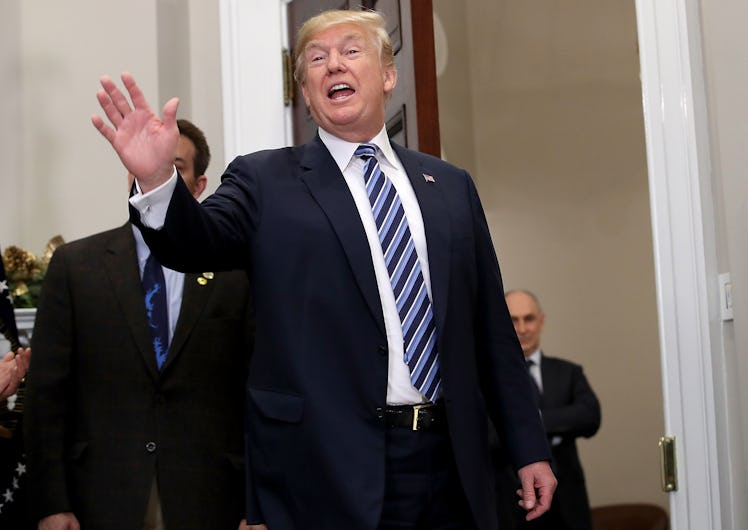
Trump Promised To Get Rid Of "Redundancy & Duplication" & Twitter Made The Same Joke
On Thursday, Dec. 14, President Donald Trump's administration committed an inexcusable and unforgivable offense (well, for the word police, at least)! His choice of grammar was both offensive and insulting, but it was at the same time funny and amusing. In fact, nothing highlights how outrageous and absurd this event was better than the tweets about Trump's "redundancy and duplication" quote.
That quote is exactly what was attributed to President Trump in a statement and press release from the White House on Thursday, Dec. 14. To be more specific and precise, the president was quoted as saying "we will get rid of the redundancy and duplication that wastes your time and your money."
Of course, people on Twitter were bound to take notice and point this out. After all, nothing shows a commitment to combatting redundancy and duplication like a statement guilty of redundancy (and duplication).
"We will get rid of the redundancy and duplication that waste your time and your money" - @realDonaldTrump being, unintentionally, really funny," one commenter wrote. Another tweeted, "they have sworn to stamp out and abolish all redundancy and duplication, y’all. Literally."
Some people joked about Trump's qu — I'm sorry — quote and statement by simply highlighting the redundancy and duplication in saying "redundancy and duplication." In the end, ultimately, people were pretty much making the same joke.
But No, Seriously, Let's Talk About Redundancy And Duplication
And now, some context. The whole reason the White House put out that "redundancy and duplication" press release was because President Trump hosted a press conference during which he celebrated his progress in getting rid of regulations related to areas like health care, construction, and the environment.
Trump has made no mistake in expressing how much he thinks the U.S. government over-regulates businesses. And if you didn't know that up 'til now, just check out literally the first thing he said during the press conference yesterday: "Hello, everybody. Regulations — oh, boy. It’s a lot of regulations."
Yeah.
Anyway, here's a bit more from the president that points at one of the most consequential, but seemingly least talked about features of his presidency.
"We’ve begun the most far-reaching regulatory reform in American history," Trump said at the White House on Thursday. "We’ve approved long-stalled projects like the Keystone XL and the Dakota Access pipelines. We’re cutting years of wasted time and money out of the permitting process for vital infrastructure projects. We’re scrapping and really doing a job in getting rid of the job-killing regulations that threatened our autoworkers and have devastated their jobs over the years. But they’re all moving back."
Now, exactly how one quantifies "the most far-reaching regulatory reform" or how "they're all moving back" is a conversation for another day. The bottom line is Trump came into the White House promising to get rid of two regulations for every new one created. On Thursday, he announced he's even outpaced that standard of deregulation.
"And instead of eliminating two old regulations, for every one new regulation we have eliminated 22 — 22 — that’s a big difference. We aimed for two for one, and, in 2017, we hit 22 for one," the president said.
The ambition to deregulate is indicative of the ideological divide on the state of regulations today. People who are against it, like Trump, say it disincentives businesses, making new projects too much of a hassle, which comes at the cost of innovation and jobs. Plus, only the greatest companies has all the lawyers and power to fight through the red tape and regulations, which means smaller companies are at a disadvantage (Trump literally cut red tape on Thursday, by the way).
Again, that's the argument, at least.
On the other side is pretty much a much simpler argument: regulations are needed to limit the powers of companies who otherwise will do anything — moral or not — as long as that anything makes profit.
But a Republican is in the White House, and Republicans control Congress, so there's pretty much one school of thought that matter most now, by far. And that's how you get the death of significant regulations like... Net Neutrality.